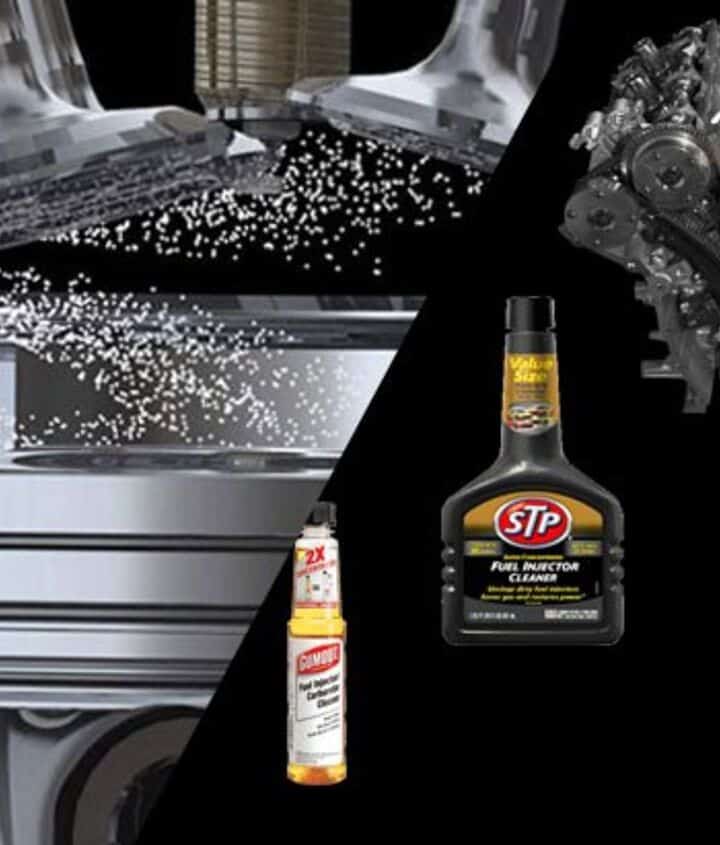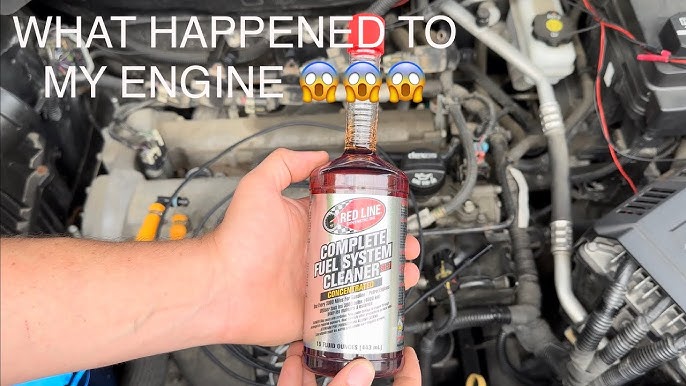Maintaining our engines running smoothly and efficiently is a top priority in the automotive world. And when it comes to maintaining our fuel systems, two products often come to mind: fuel injector cleaner and fuel system cleaner. But what exactly is the difference between these two cleaning solutions? While both products aim to improve performance and remove deposits in the fuel system, they target different components and provide distinct benefits. This article will explore the dissimilarities and help you choose the right cleaner for your specific needs.
This image is the property of i.ytimg.com.
Fuel Injector Cleaner
Definition
A fuel injector cleaner is a specialized product designed to clean the fuel injectors in an engine. Fuel injectors play a crucial role in combustion by delivering fuel to the engine in a fine mist form. Over time, these fuel injectors can become clogged and dirty, leading to decreased fuel efficiency and engine performance. A fuel injector cleaner removes deposits and impurities from the fuel injectors, allowing for better fuel atomization and more efficient combustion.
Function
The primary function of a fuel injector cleaner is to remove deposits and impurities from the fuel injectors. These deposits can accumulate over time due to the impurities present in the fuel or from the combustion process itself. When the fuel injectors become clogged, fuel flow is disrupted, leading to poor fuel atomization and inefficient combustion. A fuel injector cleaner uses a potent cleaning formula to dissolve these deposits and restore the fuel injectors’ proper function.
Types
There are several types of fuel injector cleaners available on the market. Some fuel injector cleaners are designed to be added directly to the fuel tank, where they mix with the fuel and are carried through the fuel system, cleaning the fuel injectors as they pass through. Other fuel injector cleaners are more concentrated and require a direct application to the fuel injectors, either through a specialized tool or by removing the injectors from the engine.
Benefits
Using a fuel injector cleaner has several benefits for your vehicle. Firstly, it can improve fuel efficiency by ensuring the fuel injectors deliver fuel in a fine mist, allowing for better combustion. This can result in better mileage and reduced fuel consumption. Secondly, a fuel injector cleaner can enhance engine performance by restoring optimal fuel flow and atomization. This can lead to smoother acceleration, improved throttle response, and improved engine operation. Lastly, regular use of a fuel injector cleaner can help prevent the buildup of deposits and keep the fuel injectors clean, prolonging their lifespan and preventing potential damage.
Application
The application of a fuel injector cleaner can vary depending on the product. For fuel injector cleaners added to the fuel tank, follow the instructions on the product label and pour the recommended amount of cleaner into the fuel tank. The cleaner will mix with the fuel, and as you drive, it will pass through the fuel system, cleaning the fuel injectors. For more concentrated fuel injector cleaners that require direct application, you may need to consult a professional mechanic or follow the specific instructions provided by the product manufacturer.
Frequency of Use
The frequency of using a fuel injector cleaner can vary depending on your vehicle’s condition and maintenance schedule. As a general guideline, it is recommended to use a fuel injector cleaner every 3,000 to 5,000 miles or as specified by your vehicle manufacturer. However, notice any signs of decreased engine performance, such as rough idle or reduced fuel efficiency. Using a fuel injector cleaner more frequently to address any potential issues may be beneficial.
Common Ingredients
Fuel injector cleaners typically contain a mixture of detergents, solvents, and other additives specifically formulated to dissolve and remove deposits from the fuel injectors. These ingredients are designed to be safe for use in fuel systems and can effectively clean and restore the fuel injectors’ performance. However, reading the product label and checking for any specific ingredients that may cause allergies or adverse reactions is essential.
Cost
The cost of fuel injector cleaners can vary depending on the product’s brand, type, and quantity. Generally, fuel injector cleaners added to the fuel tank are more affordable, ranging from $5 to $20 per bottle. On the other hand, more concentrated fuel injector cleaners that require direct application might be slightly more expensive, with prices ranging from $10 to $50 or more. However, it is essential to consider the potential savings in fuel efficiency and engine performance that can be achieved using a fuel injector cleaner.
Effectiveness
Fuel injector cleaners have proven effective in maintaining and restoring fuel injector performance. With regular use, they can effectively remove deposits and impurities, improving fuel atomization and combustion efficiency. However, it is essential to note that the effectiveness of a fuel injector cleaner can vary depending on the severity of the deposits and the overall condition of the fuel injectors. In some cases, severe or long-standing deposits may require more intensive cleaning methods, such as professional fuel injector cleaning services.
Potential Risks
While fuel injector cleaners are generally safe, being aware of some potential risks is essential. Firstly, some fuel injector cleaners may have strong chemical odors or fumes, so using them in a well-ventilated area is essential. Additionally, certain fuel injector cleaners may contain ingredients that could cause skin or eye irritation, so it is advisable to use protective gloves and goggles when handling these products. Lastly, it is crucial to follow the instructions provided by the product manufacturer and avoid overusing fuel injector cleaners, as excessive cleaning can damage the fuel injectors or other fuel system components.
Fuel System Cleaner
Definition
A fuel system cleaner is a product designed to clean various fuel system components, including fuel injectors, intake valves, carburetors (in older vehicles), and combustion chambers. While fuel injector cleaners primarily focus on cleaning the fuel injectors, fuel system cleaners offer a more comprehensive cleaning solution for the entire fuel system.
Function
The primary function of a fuel system cleaner is to remove deposits and impurities from the various components of the fuel system. Over time, these deposits can accumulate and hinder the proper functioning of the fuel system, leading to reduced fuel efficiency and engine performance. A fuel system cleaner uses a specialized formula to dissolve and remove these deposits, ensuring optimal fuel flow, combustion, and overall engine performance.
Types
Similar to fuel injector cleaners, various types of fuel system cleaners are available on the market. Some fuel system cleaners are designed to be added directly to the fuel tank, mixing with the fuel and traveling through the entire fuel system, cleaning the components as they pass through. Others may require direct application to specific components, such as intake valves or combustion chambers, to remove deposits and impurities effectively.
Benefits
Using a fuel system cleaner offers several benefits for your vehicle. Firstly, it can improve fuel efficiency by ensuring that all fuel system components are functioning optimally. By removing deposits and impurities from the fuel injectors, intake valves, and combustion chambers, a fuel system cleaner helps promote better fuel atomization and more efficient combustion, resulting in improved mileage. Secondly, a fuel system cleaner can enhance overall engine performance by restoring optimal fuel flow and reducing the risk of engine misfires or hesitations caused by deposits. Lastly, regular use of a fuel system cleaner can help prevent the buildup of deposits, prolonging the lifespan of critical fuel system components and avoiding potentially costly repairs.
Application
The application of a fuel system cleaner depends on the specific product and its recommended usage instructions. For fuel system cleaners added to the fuel tank, follow the product label’s instructions and pour the appropriate amount of cleaner into the fuel tank. The cleaner will then mix with the fuel and be carried through the fuel system, cleaning the various components as it passes through. For fuel system cleaners that require direct application to specific components, it is advisable to consult a professional mechanic or follow the instructions provided by the product manufacturer.
Frequency of Use
Using a fuel system cleaner is typically less frequent than using a fuel injector cleaner. It is generally recommended to use a fuel system cleaner every 10,000 to 15,000 miles or as specified by your vehicle manufacturer. This interval allows for regular maintenance and ensures the fuel system remains clean and in optimal condition. However, it is essential to consider factors such as the vehicle’s usage, fuel quality, and overall performance when determining the frequency of use for a fuel system cleaner.
Common Ingredients
Fuel system cleaners share many common ingredients with fuel injector cleaners, aiming to remove deposits and impurities from the fuel system. These ingredients often include detergents, solvents, corrosion inhibitors, and other additives that dissolve and remove deposits from various fuel system components. As with fuel injector cleaners, it is advisable to read the product label and check for any specific ingredients that may cause allergies or adverse reactions.
Cost
The cost of fuel system cleaners can vary depending on the product’s brand, type, and quantity. Generally, fuel system cleaners added to the fuel tank are priced similarly to fuel injector cleaners, ranging from $5 to $20 per bottle. Fuel system cleaners that require direct application may have slightly higher prices, ranging from $10 to $50 or more, depending on the specific product and application method. Consider the potential benefits and long-term savings in fuel efficiency and maintenance costs when evaluating the cost of a fuel system cleaner.
Effectiveness
Fuel system cleaners, when used according to the manufacturer’s instructions, have been proven effective in cleaning and maintaining the performance of the entire fuel system. A fuel system cleaner ensures optimal fuel flow and combustion efficiency by removing deposits and impurities from the fuel injectors, intake valves, combustion chambers, and other components. Regular use of a fuel system cleaner can help address issues such as decreased fuel efficiency, engine misfires, rough idling, and overall poor engine performance. However, severe or long-standing deposits may require more intensive cleaning methods or professional assistance.
Potential Risks
As with fuel injector cleaners, some potential risks are associated with using fuel system cleaners. Some fuel system cleaners may have strong chemical odors or fumes, so using them in a well-ventilated area is essential. Certain products may also contain ingredients that could cause skin or eye irritation, so taking necessary precautions, such as wearing protective gloves and goggles, is advisable. It is crucial to follow the instructions provided by the product manufacturer and avoid excessive use, as it may damage fuel system components or other adverse effects. If unsure, it is recommended to consult a professional mechanic for guidance on using fuel system cleaners effectively and safely.
This image is the property of i.ytimg.com.




